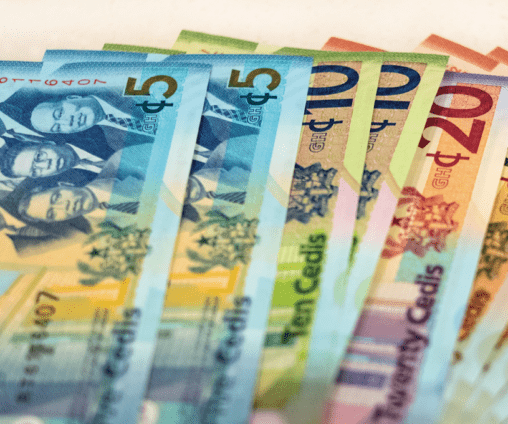The cedi’s recent revival appears to be on for a sustained run – on the back of increased forex liquidity amid the IMF’s Staff-Level Agreement and government’s recent suspension of coupon payments on some external bonds as well as the Bank of Ghana’s interventions.
The local currency stabilising around the GH¢15 mark after a period of sustained depreciation, and the rapid gains it has made in recent weeks was largely due to clarity on debt restructuring, the IMF’s Staff-Level Agreement and regulatory interventions from the Bank of Ghana, as well as speculative selling and profit-taking.
The reversal of fortune has seen the local unit move from the ‘worst-performing’ currency in the world in mid-October to become the ‘best performer’ for the corresponding period of December, with the average interbank rate at the close of business on Monday, December 19, 2022 showing that US$1 was being exchanged for GH¢8, according to the Bank of Ghana (BoG).
In addition to the above, the impending IMF programme is expected to offer concessional lending to promote the accumulation of foreign exchange reserves – which will aid in maintaining the cedi’s stability.
In an update on the economy, Finance Minister Ken Ofori-Atta highlighted that, ultimately, confidence and the active participation of all stakeholders are the essential elements for success of the proposed debt exchange programme.
“As such, government is committed to laying out a path toward attaining debt sustainability, informed by sound technical analysis and broad stakeholder engagement,” he said.
“So far, we have all witnessed the cedi’s gains over the past week, as well as the attainment of this Staff Level Agreement in near-record time. We must and we will collectively recover all,” Mr. Ofori-Atta added.
Last week, the cedi saw significant gains against the US$, GB£ and € on the interbank reference market, increasing by 56.95 percent, 58.18 percent, and 55.80 percent respectively. This continues the cedi’s strong correction over the past weeks, resulting in a decrease in its year-to-date (YTD) loss against the US$ to 24.94 percent – from 54.17 percent – on the interbank market.
The € and GB£ have also significantly strengthened over the past two weeks, with similar trends in the retail market; with the € YTD loss decreasing to 19.56 percent, from 51.07 percent, and the GB£’s YTD loss decreasing from 51.07 percent.
Also, the typical seasonal effects of increased imports around the holiday season have remained muted this year – as importers acted earlier in the year for fear of the higher cost for accessing forex during this period, contributing to the depreciation in October and November.
The central bank’s liquidity intervention, the surge in remittances and tourist spending over the holiday season, and improved FX offers from speculators as a result of the IMF agreement are other factors that contributed to the cedi’s appreciation.
GCB Capital, in its analysis of the currency market, anticipates that the cedi will continue to stabilise in the upcoming days, helped by increased liquidity as “the impending IMF programme will offer concessional lending to promote the accumulation of foreign exchange reserves, which will aid in maintaining cedi stability”.
Government’s engagement with the IMF is anchored on the Post-Covid Programme for Economic Growth (PC-PEG), which aims to restore macroeconomic stability and debt sustainability for a stronger and inclusive recovery. Following further stakeholder engagements, government last week agreed to extend the expiration date for the domestic debt exchange to December 30, 2022 to allow for key concerns raised by stakeholders to be accommodated in some form.
“Our ‘end-game’ as a government has always been to achieve a Ghana Beyond Aid – a Wealthy, Inclusive, Sustainable, Empowered and Resilient society (a WISER Ghana). The necessary precondition for this is a stable macroeconomic environment. Viewed from that lens, restructuring our debt is only a necessary part of our story,” the Finance Minister said, anticipating the IMF programme’s approval in the first quarter of 2023.
Impact on cedi-equivalent of External Debts
The cocktail of factors should see pressure on the Treasury ease up. For instance, the external debt stock grew by more than 40 percent by the end of September to GH¢271.71billion, or 44.15 percent of GDP, on account of the cedi’s 37.5 percent depreciation against the US dollar. As of the end of September, the cedi to dollar rate was approximately GH¢9.6 to US$1. Consequently, the debt stock could shrink by as much as GH¢45billion by the close of the year if the cedi maintains its momentum.
Furthermore, the crude oil import bill – which contributed significantly to the depletion of external reserves to 2.9 months of import cover at the end of October 2022 – is expected to reduce further due to the lower global crude prices; but more importantly, the strengthened cedi.
Debt Restructuring & External Bondholders’ Response
The nation’s external bondholders, following the suspension of coupon payments announcement, indicated through a communique that they had formed a representative committee to engage with government – while sounding upbeat about the International Monetary Fund’s (IMFs) participation in the wider process.
“The Committee is focused on the orderly and comprehensive resolution of Ghana’s debt challenges, recognising that such resolution will require fair burden-sharing and collaboration among the Ghanaian authorities, private creditors (both domestic and international) and official sector creditors. The Committee welcomes the authorities’ ongoing engagement with the International Monetary Fund (IMF) and recent announcement of the Staff Level Agreement,” the statement read.
“The Committee aims at securing an outcome that is both equitable to creditors and responsive to the economic and social challenges facing Ghana,” it added.










